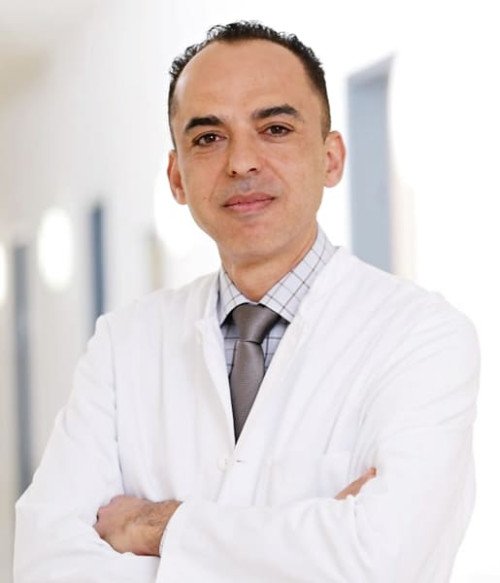Surgery Treatment in Germany
Germany is renowned for being one of the world's leaders concerning medical and surgical care. Advanced facilities, cutting-edge technologies, and experienced medical professionals make people look forward to quality surgical treatment.
Examples include treatments for complex cancers, organ transplantation, and minimally invasive procedures. Being well-equipped with all the treatment options guarantees a patient the best result.
What is surgery?
Surgery is one sort of medical treatment that cuts or manipulates tissues in the body to diagnose, treat, or repair injuries and damage, often going a long way when some conditions like tumors, infections, or injuries cannot be treated with medications.
It can range even from minor procedures to complex operations involving multiple organs. Generally, the main aim of surgery is to improve the health of patients and alleviate symptoms, as well as help save many in some cases.
Types of Surgery
In Germany, various surgical treatments exist for every medical condition. The most popular types of surgeries provided in Germany include:
General Surgery: These embrace treatment issues revolving around the abdomen, such as appendicitis removal, hernia correction, and gallbladder operations.
Oncology Surgery: This is the elimination of tumors and other tissues by oncology surgery on cancer patients to cut the spreading potential of the cancer.
Orthopedic Surgery: These embrace operations about bones, joints, and even muscles; examples are knee replacement surgeries, spinal procedures, and fracture treatment.
Heart Surgery: Heart surgeries, such as CABG, valve repair, and heart transplantation processes, are most often undertaken in Germany with excellent success rates.
Organ Transplant Surgery: Organ transplants, kidney transplants, liver transplants, and lung transplants are carried out with excellent expertise in Germany.
Surgery Diagnosis in Germany
Any surgery is successful primarily because of a proper diagnosis. Germany has advanced diagnostic procedures, and their hospitals combine lab tests with high technology to get the most precise diagnosis. Among them are some of the most commonly used diagnostic tools:
CT scans: computed tomography, or CT, scans offer images of specific details about the internal structures of the body.
MRI: A soft tissue injury and other diseases like brain tumors or disorders of the spinal cord may be diagnosed with the help of MRI.
PET Scans: It is a PET scan that is used to find the trace of cancer and its growth.
Such advanced diagnostic equipment makes it possible for the surgeons to know what ails the patient before deciding and doing the surgery. Many German hospitals also use real-time imaging during the surgery to make more precise the procedure.
Early Diagnosis of Surgery
Early diagnosis is critical to effective treatment, especially concerning cancer and other fatal conditions. German doctors attach so much importance to early detection through checks and screenings. The complex diagnostic equipment allows for as early an identification of the condition as possible.
Cancers detected at their earliest stages stand a better chance of being treated using less invasive surgical methods than if they are established. Recovery and treatment result in better outcomes.
Treatment Centers for Surgery in Germany
Germany has some of the world's best stocked hospitals, which focus on modern infrastructure, the latest equipment in medicine, as well as highly qualified and specialized surgical departments. These treatment centers comprise:
Minimally Invasive Units for Surgery: Equipped with the latest systems for laparoscopic as well as robotic surgery.
Oncology Centers: specialized in cancer treatment, offering a multidisciplinary approach that includes surgery, chemotherapy, and radiation.
Transplant hospitals: These are institutions known to carry out organ transplant surgeries. They have equipped operating rooms as well as post-operative care wards.
Rehabilitation hospitals: These provide comprehensive rehabilitation procedures for patients undergoing surgery.
Many German hospitals are also categorized according to international patient services, which offer the patients travel arrangement facilitation, language facilitation, and post-surgery care coordination.
Surgery with High-Tech Treatment
Advances in surgical procedures have been most definitely advanced in Germany, especially in minimally invasive techniques, by which complex operations could be performed with minimal incisions. There is laparoscopy, which is considered to be the leading technique used today, where a camera and small surgical instruments are inserted through such tiny incisions, meaning less tissue damage, faster recovery, and fewer risks of complications.
Robotic-assisted surgery is also considered highly prevalent in Germany. The availability of robots, like the Da Vinci system, has enabled surgeons to perform those tough procedures with much accuracy and has minimized the likelihood of the presence of human error. The list of advanced techniques usually includes procedures within the areas of urology, gynecology, and thoracic surgery.
Chemotherapy and Radiation Therapy
Germany provides a comprehensive cancer surgery treatment program that typically includes radiation and chemotherapy. Chemotherapy drugs focus on cancer cells by stopping the growth of these cells.
Radiation therapy involves the use of high-energy radiation that can kill the cancer cells. Both chemotherapy and radiation therapy may help reduce the size of a tumor before surgery or clear up any remaining cancer cells in the body after the surgical removal of the tumor.
New Approaches: Immunotherapy and Targeted Therapy
German hospitals, aside from the common chemotherapy and radiation, have evolved into other forms of treatment, such as immunotherapy and targeted therapy.
Immunotherapy is said to enhance a body's natural defense against cancer. It works on enhancing or restoring the immune system already present in one's body, where it recognizes the cancer cells and kills them or fights them off.
Therapy makes use of drugs engineered in a way that they specifically target the genetic alterations within cancer cells driving their growth. This therapy spares normal cells, has reduced adverse effects, and produces favorable effects in patients.
They are frequently used together with surgery, mainly due to advanced cancers where traditional treatments cannot be so effective.
Identification and Thyroid Surgery
Surgery for the Thyroid, German hospitals do not joke with this aspect. Thyroid diseases fall under conditions such as tumors or hyperthyroidism, which can only be treated with an operation. The surgeons in Germany are armed with proper diagnostic tools to spot diseases early enough and operate only when it is inevitable. They can use wide-ranging imaging techniques and minimally invasive operations to treat the tumor while conserving as many thyroid functions as possible.
Rehabilitation after Surgery Treatment
Post operative rehabilitation is one of the primary factors that determine recovery. In Germany, post-operative treatment is administered through broad rehabilitation programs as per the necessities of each patient. The rehabilitation programs may include
Physical Therapy: Patients generally experience muscular weakness and slackness, post their surgery. This program helps a patient regain his muscular strength and flexibility.
Occupational Therapy: The patient needs time to readapt his daily activities following surgery.
Nutritional counseling: Mostly for patients who have undergone gastrointestinal surgery or are undergoing cancer treatment.
The German rehab centers have a personalized approach and care about their patients returning to normal life as soon as possible and as safely as possible.
Psychological Counseling
More critical, however, is the psychological impact of surgery on a patient's mental state if it involves severe or potentially life-threatening diseases such as cancer. Psychological counseling forms an integral component of post surgical treatment in Germany.
Patients are taken care of psychologically to handle the stress and anxiety commonly arising from surgical recovery. Patients can work with trained therapists for resolution of concerns, management of their stress, and improvement of their general mental health.
Cost of Surgery in Germany
Germany's surgery is relatively more expensive compared to other countries but is of great value with high quality since standards of care, advanced technology, and low risks of complications. The cost range varies for surgery depending on different factors, which include the complexity level, choice of hospital, and the surgeon.
The cost of secondary consultations and smaller surgeries would be relatively less, whereas complicated surgeries are priced correspondingly. Most hospitals have combined packages including preoperative examinations, surgery, and postoperative care, thereby making it easier for the patient to understand the aggregate costs involved.
Best Top Surgery Clinics in Germany
Germany houses some of the world's top medical surgery hospitals. Here are a few in that league:
University Hospital Frankfurt am Main: Dedicated to performing the surgical procedures of the abdominal and colon, has quality services for performing cancer surgery.
University Hospital Rechts der Isar Munich: Has amazing surgical capabilities concerning diseases related to the esophagus and stomach.
Helios Hospital Berlin-Buch: Treats cancers related to the gastrointestinal area; it has used all the latest treatments, including HIPEC.
University Hospital Aachen: The hospital specializes in providing patients with minimally invasive surgical procedures as well as bariatric treatment.
These hospitals not only offer the latest surgical treatments but also serve international patients, making Germany one of the prime medical tourism destinations.
Why surgery in Germany?
Germany is considered to be a number one destination for the following reasons:
World-Class Experts: German surgeons are so skilled that many of them have professional training qualifications from leading schools around the world.
Up-to-date Medical Technology: The hospitals are therefore adequately equipped with the latest medical technology, including robotic-assisted surgery and also real-time imaging systems.
Minimally Invasive Techniques: These techniques reduce the risks of complications, shorten recovery times, and also generally improve patient outcomes.
Holistic Care: As a treatment destination, the state provides overall approaches to holistic care, preoperative planning, extensive surgical operations, and post-surgical care and rehabilitation.
Major Benefits of Treating in Germany
There are several advantages to choose Germany for treatment:
Minimally Invasive Surgery: These are less invasive. Thus, patients shall recover faster without many complications.
World-Class Facilities: The hospitals have the most recently developed medical technology for providing the best possible care.
Trained and experienced Surgical Teams: Germany is known to be one of the finest surgical centers in the world, and these teams are skilled and experienced.
Extensive rehabilitation programs: After surgery, post-op care is focused on speedy and safe recovery to daily routine.
👉 Contact us for further information and receive a complimentary consultation.
Removing or repairing diseased tissues and organs. Remove the obstruction. Repetitive structures in their normal position
Some surgeries can reduce or prevent pain. Others may relieve symptoms of a problem or improve body function. Some operations are performed to find the problem. Such as, a surgeon may perform a biopsy, in which a piece of tissue is removed and examined under a microscope.
Surgical treatment involves surgically removing the remains of your baby and pregnancy tissue using a suction device. Since this is likely a planned surgery, you will have some time to prepare. You may be recommended surgery if: You have heavy and persistent bleeding.
A surgical procedure which is penetrates and exposes a body cavity. Any procedure has the potential to cause permanent physical (physiological) or anatomical deformity and/or any procedure involving orthopedics or extensive tissue dissection or transection.
The most dangerous surgical procedures in which: Heart surgery, Cancer surgery, Transplants, Spinal cord surgery and the Brain surgery. One of the most dangerous procedures is any type of surgery on the brain or skull.
Experience the difference that expertise and compassion can make. Meet our exceptional team of experienced doctors, and trust us to provide you with the best in healthcare.

Surgery
Chief Physician of the Department for Visceral, Minimally Invasive, and Oncological Surgery
Düsseldorf

Surgery
Clinic Director Department Visceral and Transplant Surgery
Munich / München

Surgery
Medical Director of the Department of General, Visceral, and Transplant Surgery
Heidelberg

Surgery
Medical Director of the Department of General, Visceral, and Transplant Surgery
Tübingen

Surgery
Director of Surgery Department Recht der Isar
Munich / München

Surgery
Director of the Transplantation Center at University Hospital Münster
Muenster / Münster

Surgery
Director of the Clinic Specialist in Visceral Surgery
Düsseldorf

Surgery
Clinic Director Department: Surgery, Vascular Surgery, and Visceral Surgery
Erlangen

Surgery
Chief Physician, Deputy Head of the Colorectal Cancer and Pancreatic Carcinoma Centers
Munich / München

Surgery
Chief Physician Department: Visceral Surgery, Endocrine Surgery, and Coloproctology
Munich / München

.webp)
 (1).webp)

.webp)
 (1).webp)


.webp)
 (1).webp)

.webp)
 (1).webp)
